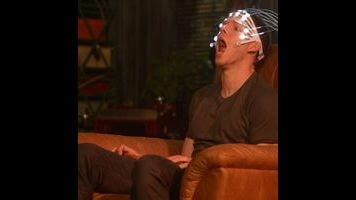The bad guys get caught while Minority Report lets itself off the hook

As a theme, there are worse ways to go than “everyone has a dark side.” Expected? Sure. But it’s expected for a reason, because it’s a) mostly true, and b) an ingredient for some pretty compelling stories—including nearly every great detective tale out there, from the film noir classics to Minority Report’s cinematic predecessor. What doesn’t make sense is why, if that’s where you’re going, you’d choose to pin that dark side on the therapist.
In its third outing, Minority Report starts in early with the dark and twisty stuff, asking where the darkness hides in each of its main characters. Dash seems like a boy scout, but he’s got a nasty competitive streak. Agatha seems downright saintly, particularly when she’s healing horse legs for free, but she’s not above tormenting (and manipulating) her shady neighbors with knowledge of their possible deaths. Vega is a good cop—or so we’re told—but she sure is a lousy friend. And the subject of the case-of-the-week seems primed to unleash his inner demons in a very violent way. He’s so primed, in fact, that the new fancy Hawk-Eye system picks up on the signals, and so of course, do the precogs. So Dash and Vega are off, determined to stop a man from becoming the worst and most homicidal version of himself.
It’s not a bad question to explore, but at least in the last case, the answer feels wrong. Every procedural show needs a decent twist now and then, and this one could be worse, to be sure. But thematically, it undermines the whole idea the episode had been selling: that we’ve all got demons, and we’re responsible for keeping them in check. Of course someone who’s been abused and manipulated by an ill-intentioned mental health professional (sometimes a lousy trope, sometimes a great one) is a victim, and that should under no circumstances be ignored. Nevertheless, absolution is an odd place to end a story that, to that point, seemed to be about personal responsibility and the sometimes catastrophic consequences to our actions.
Still, the tech magnate isn’t the biggest fish that was let off the hook in “Hawk-Eye.” The biggest fish would be Hawk-Eye itself.
The film version of Minority Report centered around a Big Idea, symbolized by the report of the title—you may be able to predict that a person will do something, but as long as they have free will, you can’t guarantee it, and that’s an awfully big ambiguity, particularly when lives hang in the balance. So far, the show seems to be dancing around this idea at best, and grossly oversimplifying it at worst. The introduction of Hawk-Eye, another system designed to predict crime before it happens, seemed to be the perfect entry into exactly that Big Idea. When Wally (Daniel London, still awesome) explained that the predicted suicide of the first Hawk-Eye arrest couldn’t simply be a suicide—that in order for Dash to see it, someone had to be responsible—for just a moment, it looked like maybe we were getting somewhere.
Alas, it was not to be. In Minority Report’s future, law enforcement will hold responsible the psychologist who helped push a patient to violence, but not the monitoring system that helped shove him over the edge. This doesn’t feel like a statement on the corruption of law enforcement, this feels like a huge thematic oversight. A psychologist reduced a man’s capacity to fear, and he nearly took his life—but harassment, surveillance, intrusion, suspension of habeas corpus, and public humiliation chipped in, too. The name Arthur saw wasn’t Hawk-Eye. It wasn’t Vega or Dash, either. Until Minority Report is willing to dig into the big, ugly questions that exist in their vision of the future, all the answers are likely to stay unsatisfying.
Stray Observations
- Speaking of unsatisfying answers: the partner at the tech company conspired with the shrink, right? First the body language analysis wasn’t admissible in court, then somehow he gave himself away via the non-admissible body language analysis, then all of a sudden some guys in fatigues arrested the partner we saw for maybe 40 seconds in the first half of the episode. Maybe I missed something (very possible), but that whole denouement confused the heck out of me.
- If someone could get on actually inventing a blue line that appears on the floor and guides you to wherever you’re going in a big unfamiliar office building or hospital or parking garage, that would be great. I will absolutely back the Kickstarter for such a device.
- Is the closest thing we have to the weird public group therapy thing those stands where you can get a massage in a mall?
- Things that still exist in the future: road rage, normal bikes, jogging, in-person job interviews, kabobs, go bags.
- “Hey, it’s that guy!” watch: Charlie the neighbor is William Mapother, a.k.a. Ethan Rom, a.k.a. the second-scariest Other.
- Li Jun Li is great in this episode. The look on her face when she walks into the “job interview” with Dash is a great blend of ‘oh-my-god-you’re-famous’ and ‘oh-my-god-I-am-totally-going-to-get-fired.”
- Seriously, Vega is the worst friend ever—and that’s fine by me. I will gladly watch a show where one of the leads is an asshole and mostly oblivious to the fact. It’s an improvement on the lack of personality in the last two weeks. She’s still wearing those impractical leather jackets, though.
- “Sometimes being a drug baby has its advantages.”